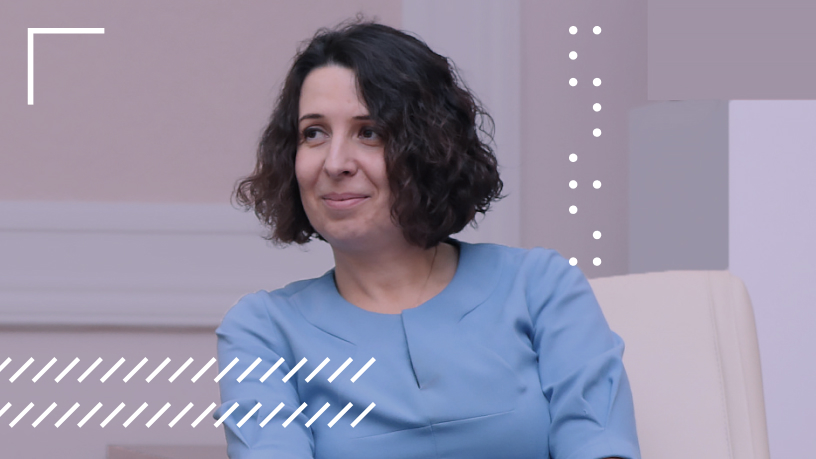
Machine translation
«I will not go back: I cannot work in a country that is at war with its neighbors,» Elena Bunina, CEO of Yandex Russia, wrote to her colleagues in early March 2022 and did not return to Russia from vacation. D. in Physics and Mathematics, Professor of Higher Algebra at the Department of Mechanics of Moscow State University, Elena Bunina created the School of Data Analysis at Yandex since 2007, was involved in personnel management since 2011, and from 2017 was the CEO of the Russian legal entity of the company until it became clear that the war would radically change the entire IT-industry.
Bunina’s name is associated with a long history of training the highest professionals in the Russian IT industry; two flagship educational centers were created with her participation: the Faculty of Computer Science at the Higher School of Economics and the Faculty of Mathematics and Computer Science at St. Petersburg State University. Her personal professional trajectory as a mathematician has been connected with the Faculty of Mechanics and Mathematics at Moscow State University all her life.
Now all three strongest departments are calculating the loss of faculty and students, Yandex is opening more and more hubs abroad in order to keep employees, and Elena herself is now a professor of the math department at Bar Ilan University and the scientific director of the educational service Practicum in the Israeli part of Yandex, or rather the part that will remain after the legal «divorce» is completed.
We sit in the meeting room of a still unnamed company on the 39th floor of the Ayalon Tower in the office section of Tel Aviv, where speech can be heard in Russian, English and Hebrew, and talk about the reproducibility of human capital in the IT industry, in mathematics, in universities, schools, corporations, and we also calculate — not only losses, but also gains.
LOSSES
T-invariant: More than a year ago you left Russia, but you did not leave Yandex. How did Yandex survive your departure? How did you survive it?
Elena Bunina: I have already left Yandex in the sense that it exists in Russia. I now work in the part of the company that is to be rebranded. I have lost touch with the Russian Yandex during this year. I lost it completely. For example, I stopped being interested in internal news, although I still formally have access to it. The hardest months were the first months of the war, when I was handing over the business. When it’s your baby, it’s not easy….
T-i: You handed things over as CEO, didn’t you?
EB: As CEO I had to hand over the right to sign and wait after the resignation letter when it went into effect in a month, nothing else. I handed things over as HR director — that was the main role — and as director of educational projects. And so the international part of the educational service Practicum moved with me. And I left the bigger Russian educational part in Russia, it was the most expensive and painful parting with it.
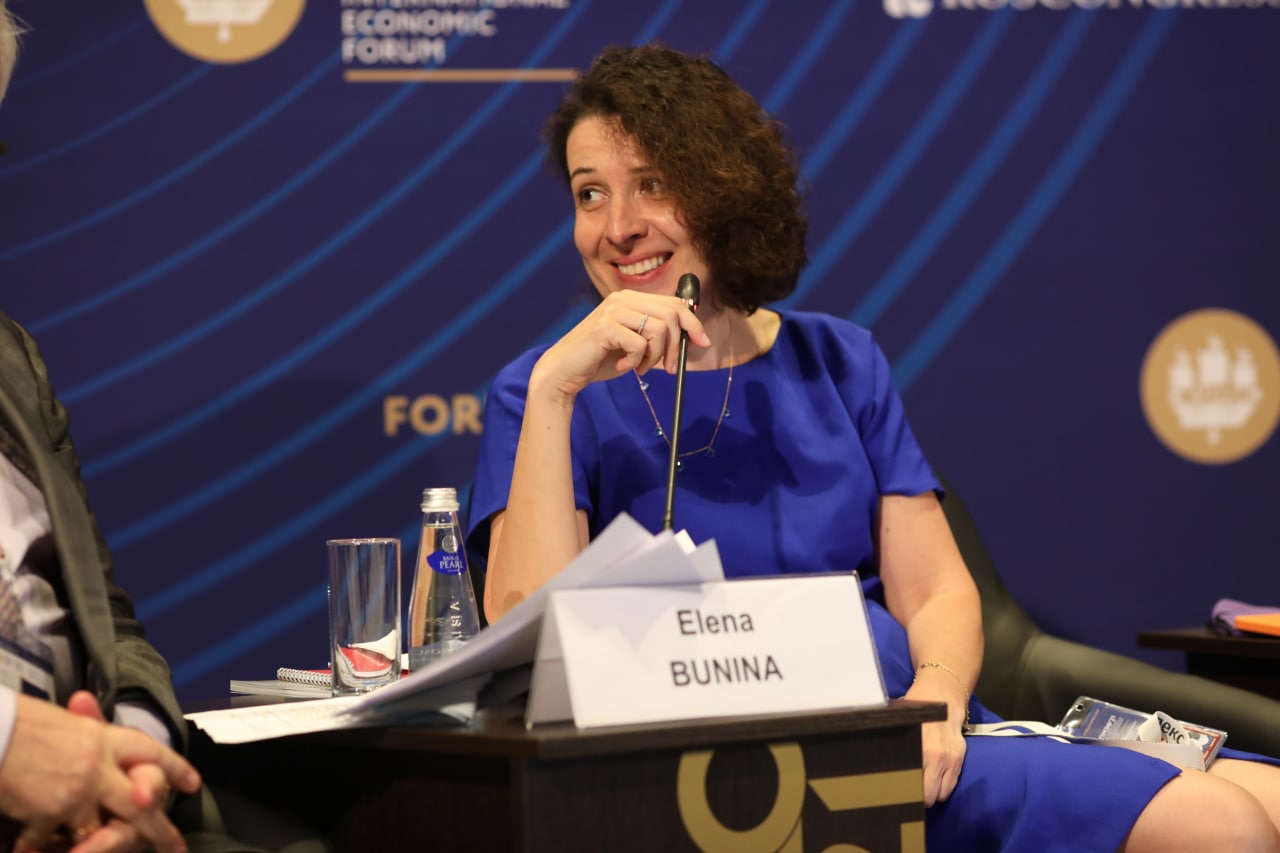
T-i: What is the foreign Yandex? How does the division take place?
EB: The Russian Yandex is the Yandex that the whole world knows, including all the services that exist in it. And our foreign, separable part will be mostly dedicated to artificial intelligence. And autonomous cars, and rovers, and cloud technologies, and training for professions related to artificial intelligence — this is just our Practicum outside of Russia. Several small services specifically related to machine learning — all of this will most likely (I say «most likely» now, because, after all, the legal process is not over yet) be combined by a small company, the size incomparable to Yandex.
T-i: Will the new company focus on the global market or the Israeli market?
EB: Global, of course. The Israeli market is very small, and we see huge opportunities for artificial intelligence around the world.
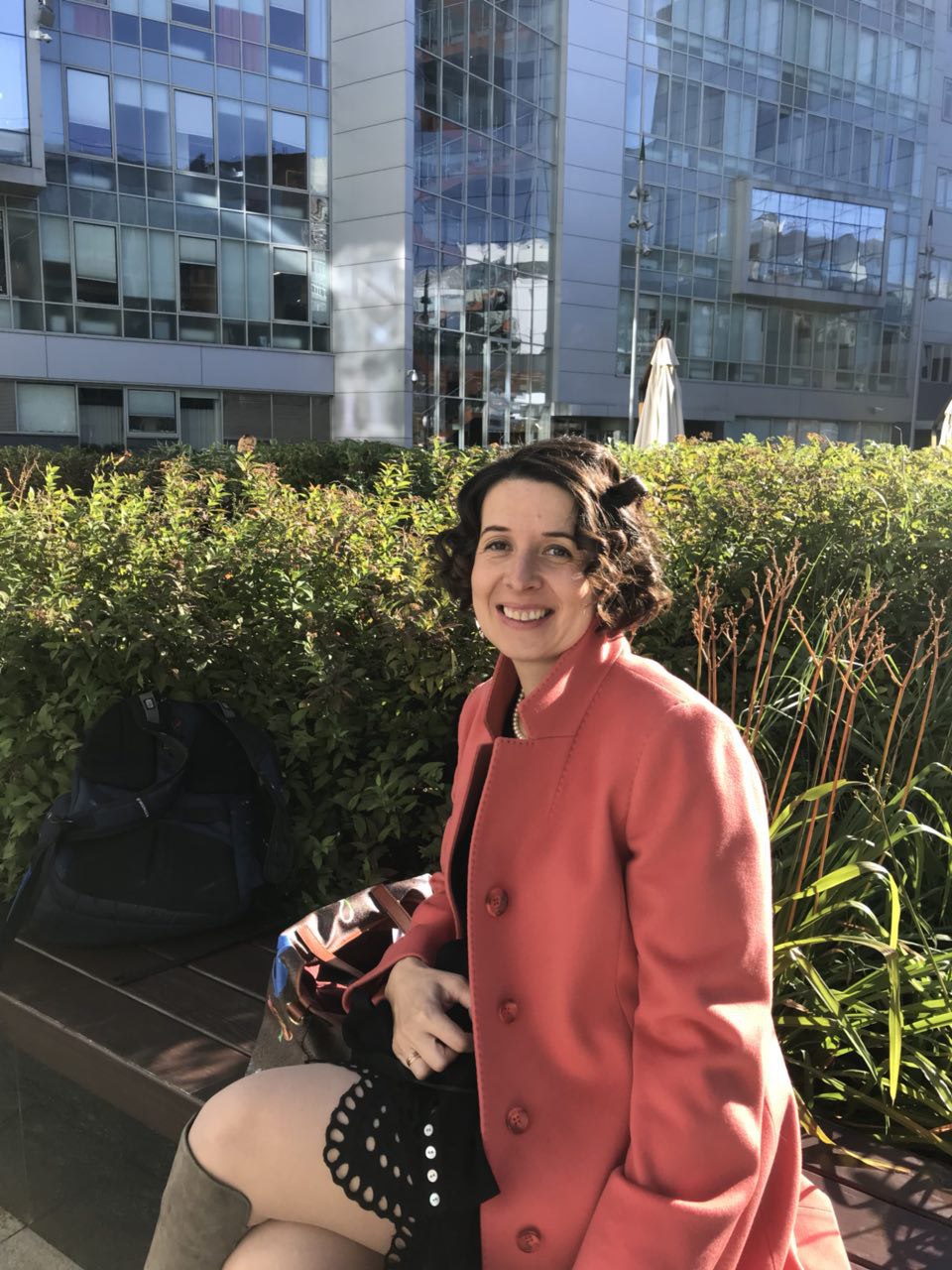
T-i: Let me ask you, as a former HR director who was involved in employee relocation. How did the separation of people take place? Geographically? Ideologically? Did a person come in and say, «I’m against the war, so I want to go to the Israeli part of Yandex or whatever company it turns out to be»?
EB: No, it had nothing to do with any ideological things. In Yandex even now there are many people who work for Russia, but live abroad and work in foreign hubs. Although, of course, the political and mobilization factor had a strong influence, because there were people who were transferred to other services. For example, having left for Israel, one wants to work in something that works for the world or for Israel, not for Russia. Some sort of rotation took place, but it was difficult, very difficult… And now it remains complicated.
T-i: Now the hubs of Russia’s Yandex are in Armenia, Kazakhstan, Serbia and Turkey. So the Yandex management is loyal to the fact that their employees are localized in different countries and in fact this is how they escape mobilization?
EB: Yes, these hubs are quite official. There is a detached part of Yandex in Israel, in America, in Holland. And then they are scattered around in different places.
T-i: You’ve been training highly qualified specialists for the company since 2007. Now, a year after there were two waves of departures, how do you assess the industry’s losses — those of young people and those who were already working in the market?
EB: Let me give you some examples. Our School of Data Analytics (SAD) from 2007 to 2022 has trained and graduated more than 1,200 specialists. These are top-specialists, and here then «specialists» replace with «professionals DATA scientists». At the start of the war, we knew that about a third of our graduates lived and worked abroad, about two-thirds were in Russia. Many of them worked at Yandex. For the most part these were graduates of older years who were already adults. Newcomers did not get abroad so quickly. That was the picture at the beginning of 2022.
But we have a SAD alumni chat room in which we do periodic surveys. After two months of war, we asked who was where. By that point, only half of the alumni remained in Russia, and half were overseas.
The next time we did a survey was after the mobilization in the fall of 2022. This time only one-third stayed in Russia, two-thirds work abroad. That’s the rate of the first year of the war about adult professionals.
With students it’s a slightly different story. If a student is, let’s say, in his third year or second, he is strongly bound by the lack of a degree and the long-term planning of educational programs at foreign universities. So it takes a lot of determination for him to leave and lose years of study. Not many people are willing to do that.
T-i: Also, most students’ departures depend on their parents’ money.
EB: Of course, the student depends on the university and the parents, so we haven’t seen all the student departures yet. My friends polled a group of fourth-year humanities students at a strong university in Russia: almost 100% of the group intends to go abroad.
I can assure you that the mass departure of students is yet to come.
The main factor that we all saw when the employees of Yandex went abroad is that it is about a thousand times harder to get a work permit, residence permit, ─ anything ─ without a higher education diploma than with one. So students wait for their diplomas as long as they have a deferment of mobilization and as long as the borders are not closed.
T-i: And do you have an explanation for the strange fact that the State Duma granted students a deferment of mobilization and twice rejected amendments to the law on the mobilization of researchers and university teachers? Don’t you think the logic is absurd: let the teachers and scientists be killed or maimed, but let the students stay?
EB: It doesn’t.
“Teachers will be killed” is the State Duma. Teachers are their peers. The deputies sit there and think, “Why should we release these people?” And the students are their children. The authorities, deputies, ministers, generals have children. You can’t tell everyone from the mobilization; it’s easier to tell all the students.
I think it’s a purely emotional thing. But do we expect them to make rational decisions?
T-i: Your whole life is closely connected with Russia’s best higher education in mathematics and computer science. What can you say about the state of the MSU Department of Mechanics and Mathematics (mechmath), the Higher School of Economics, and the Department of Mathematics and Computer Science at St. Petersburg State University after a year of war?
EB: It is difficult to assess the final picture, because no one advertises the statistics. Let’s start with the mechmath. There were about 17 people in my department of higher algebra. During the covid, almost all the professors over 80 years old died. That was the first loss. And as soon as the war began, several more left immediately. Students from mechmath leave less than from other departments, there is a six-year specialty, everyone is virtually locked in, and if you are torn without a diploma, it is a shame to start studying all over again. But I know that many of my students, who are about to graduate, are looking for graduate school abroad. At FCN at Vyshka, they say a lot of faculty have left because FCN professors are exceptionally competitive, they can just work as programmers. At St. Petersburg State University the situation is similar with the Department of Mathematics and Computer Science, almost half of the teaching staff was lost there. Moreover, programs and universities abroad are gradually opening up that are ready to take Russian teachers and students with instruction in Russian. Paphos in Cyprus now takes 80 students from Russia, Bremen also takes 80 students from Russia. Russian students are also accepted by Harbour.Space. But this is a program for Olympiads, of which the largest percentage leave.
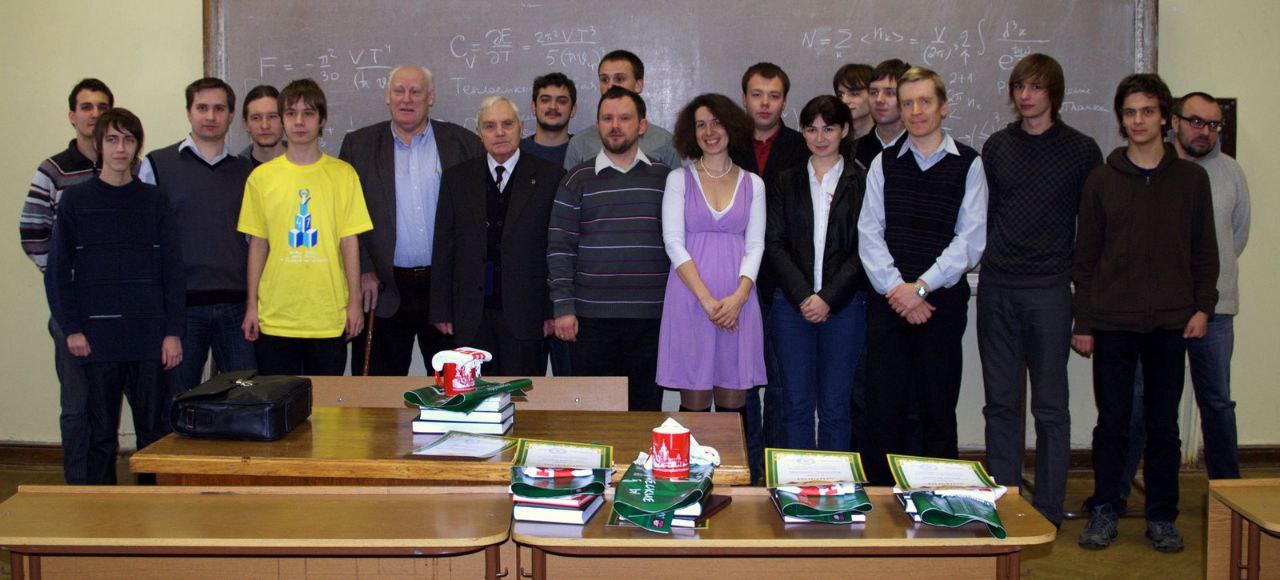
T-i: What has Israel done?
EB: The universities in Be’er Sheva and Ariel opened bachelor’s programs in Russian, which Russian students can enroll in even without English certificates. And now the university where I now work, Bar-Ilan, has also been opening a Russian-language program since September.
T-i: But education in Israel has to be paid for…
EB: If the students are new repatriates, all the education will be paid for by the Ministry of Absorption/Sokhnut, and if there is no right to repatriate, then you have to find money from parents or educational foundations. The main thing is that you can be a Russian without Jewish roots and find not very large amounts of money for tuition. Moreover, one does not need to have documents for passing exams, which are required for ordinary Israeli schoolchildren to enter a university. Instead they require a very uncomplicated test in Russian. I am now, as a mathematician, responsible for making it up. Let’s say you have to calculate light derivatives, some combinatorics, trigonometry, and pass a little interview. Then in the first year, the students learn physics and mathematics in Russian and are given a parallel Hebrew course. And from the second year, they already go to the second year with the regular Bar-Ilan students in Hebrew for physics, or for mathematics, or for a joint physics and mathematics program, as they wish. Our program was formed in a few weeks, we didn’t even have time to run an advertising campaign, and we received 70 applications from students right away. The Ministry of Absorption was even willing to pay for 200 students.
Here, then, is an example of a rapid response to the flight of students from Russia. So other countries are gradually beginning to offer convenient options for taking Russian youth out of the country.
T-i: In a recent interview with Forbes, Alexander Auzan, a colleague of yours from Moscow State University and Dean of the Faculty of Economics, assessed the biggest economic losses of this year as losses in human capital, since these are the most difficult to reproduce. Specifically, he says: «I am the producer of this human capital. You ask me, ask me, how this can be evaluated.» He estimates the reproducibility of this year’s losses to be somewhere between seven and ten years. Do you agree with him?
EB: Alexander Auzan is a very intelligent man, and I couldn’t agree with him more. As for the exact figures, a lot depends on the region. This may be true in the field of economics. In mathematics, the picture may be a little better. Mathematics is the least dependent on politics, at least in a formal sense. I’m sure they won’t rewrite the course of mathematics or algebra according to the course of the party. And perhaps, like in Soviet times, talented people will go into mathematics to hide from ideology. It will be the same with programming, with physics. This is where I see the difference in relation to the situation with economists. The second difference relative to economists is that mathematicians, physicists, chemists, programmers are more competitive to leave than economists from a country with a specific economic science, if, of course, the borders are opened. But even if the borders are closed, mathematics can secede, then still rejoin the world science — it is not waiting for such a tragic fate as economics and other social sciences or humanities. Although I read an article in your T-invariant just recently about how mathematics becomes provincial if a country closes down. But it still wouldn’t look as dramatic as it does with the social sciences.
T-i: Do they do math for ten years on Russian Island? Are you saying that the effect of Soviet mathematics behind the Iron Curtain will be repeated?
EB: We will, and even more so with the Internet. I can’t imagine that mathematicians in Russia won’t know what their colleagues abroad are doing. Another thing is that young mathematicians and physicists will leave faster and more often because of the competition, and in this sense I share Alexander Auzan’s pessimism about highly qualified specialists in general. I see mathematicians leaving, for example, for Israel. This departure is more massive than in the other sciences because mathematics is the same all over the world. There are fewer mathematicians physically, the community is tighter, the human bonds are stronger.
There is such a thing as a «Russian mathematical mafia»; it is more visible and influential than in the other sciences. And so it is all over the world, in the United States, in Europe.
I’m not even talking about Israel. In Israel it seems to me that every second professor of mathematics is Russian-speaking. The first time I came to a meeting of the Department of Mathematics at Bar Ilan University, I thought, «I know this one, this one, and this one: they are Russian-speaking.» And then other people began to turn around to me — these look like Israelis — and address me in Russian! And it turned out that almost half of my colleagues speak Russian.
GAINS
T-i: What do you see as the difference in the academic Russian and Israeli environments?
EB: I have not been in Israel that long, and so far I can only draw on personal experience. I am absolutely amazed by the environment, by the atmosphere in the department of mathematics at Bar Ilan: how friendly and therapeutic it is, I would even say so.
T-i: Therapeutic?
EB: Absolutely therapeutic. Everyone supports each other, including me, asking, «What can I do for you? Do you want me to do this for you?» — «I probably don’t need it yet.» «You do, you do! Let me do it for you.» People did feats for me that I had never seen in my life at MSU. As a result, I now have warm relations with colleagues, not only Russian-speaking, faster than during my years at MSU. Although mechmath is my alma mater, and here I am only six months as a new employee. The second characteristic that struck me is that here, when you meet colleagues, the first thing they do is tell you how many children they have, what ages they are, what they do, show photos, and expect the same response from you.
T-i: They share the most expensive things first?
EB: Yes, with each new acquaintance, ten minutes are still devoted to discussing children. There is no such thing in Russia. I also really like the campus, quiet, with lawns, without the imperial sweep. Although I really loved the MSU campus and I still feel nostalgic for it.
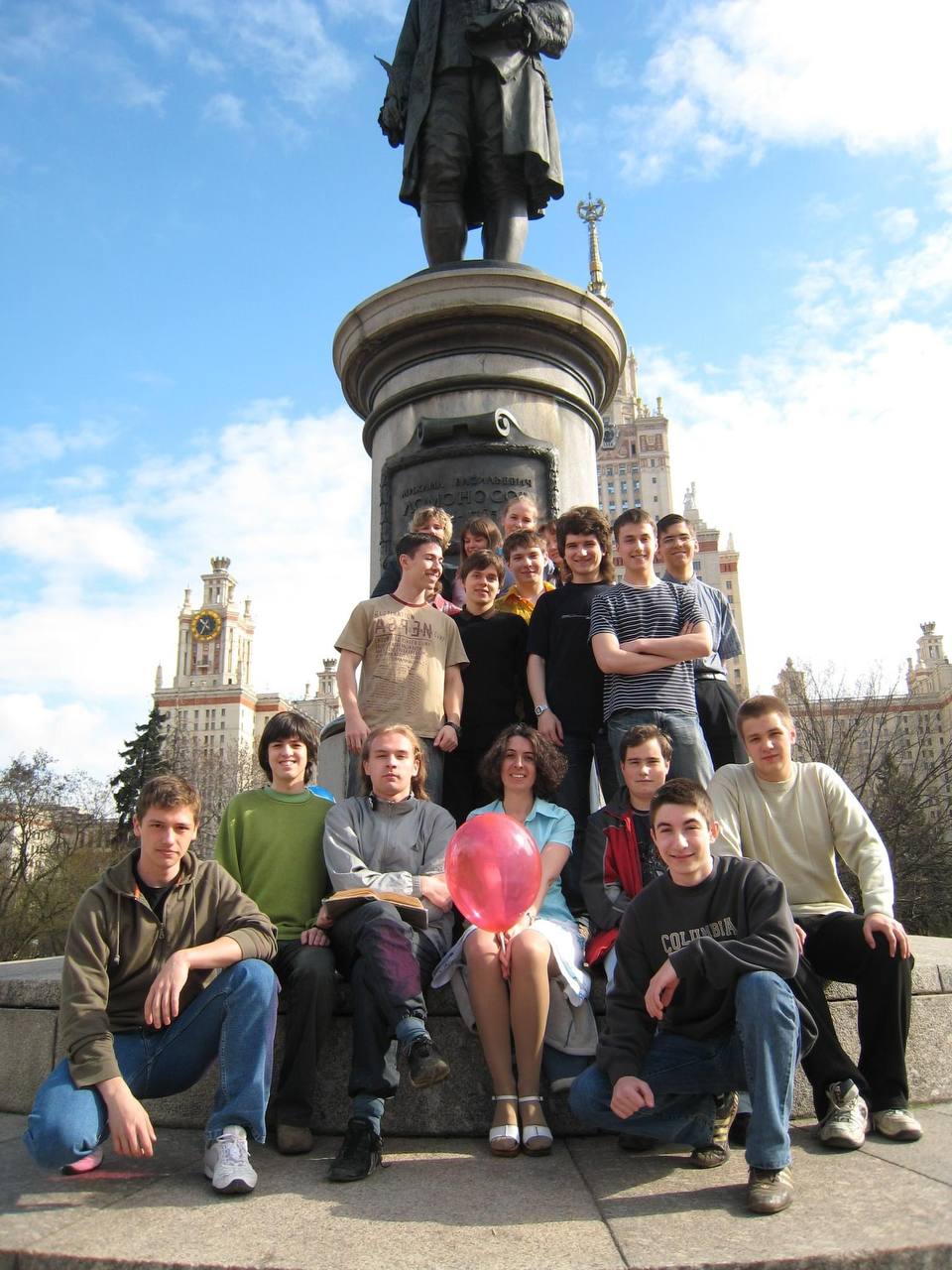
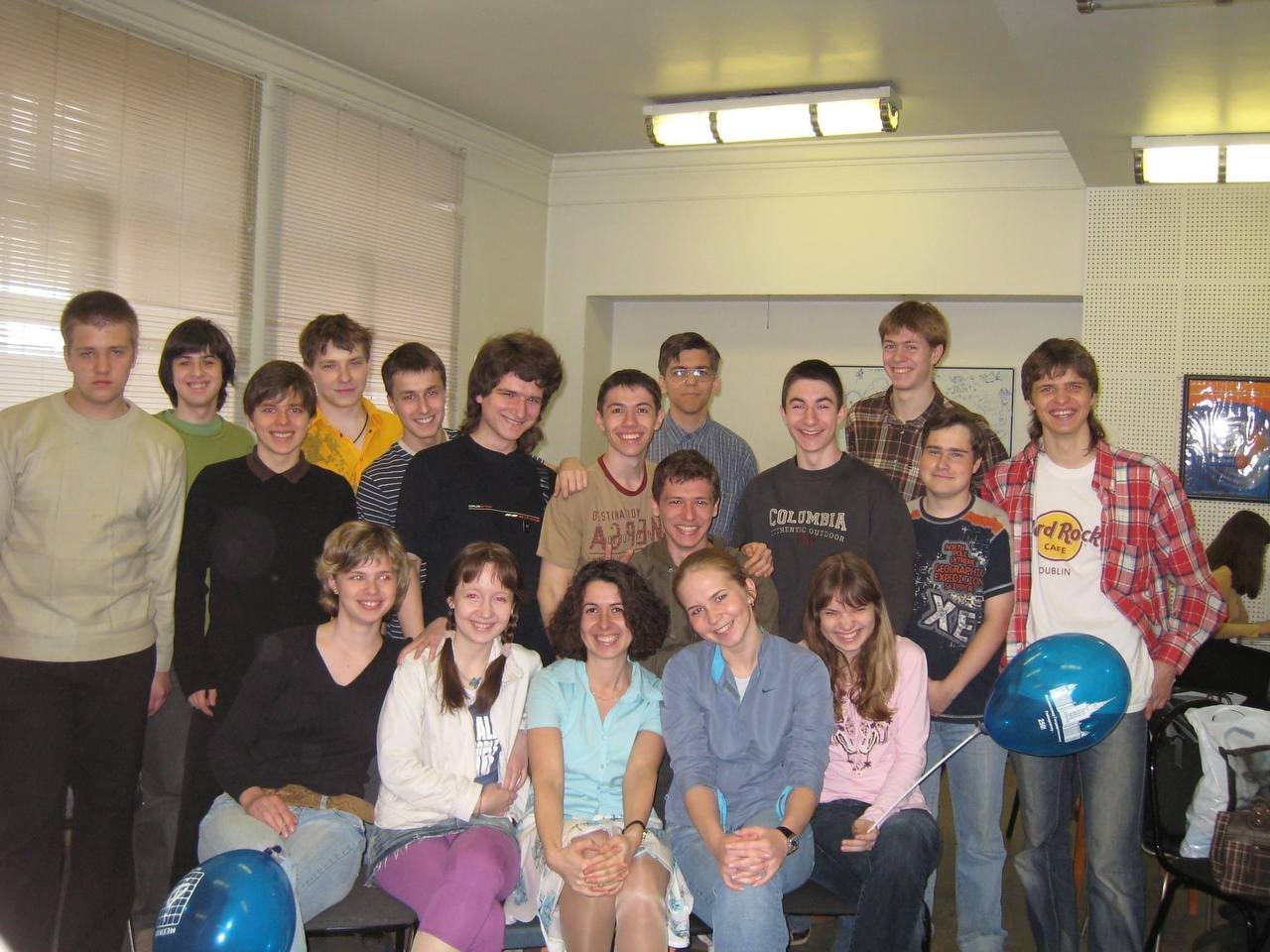
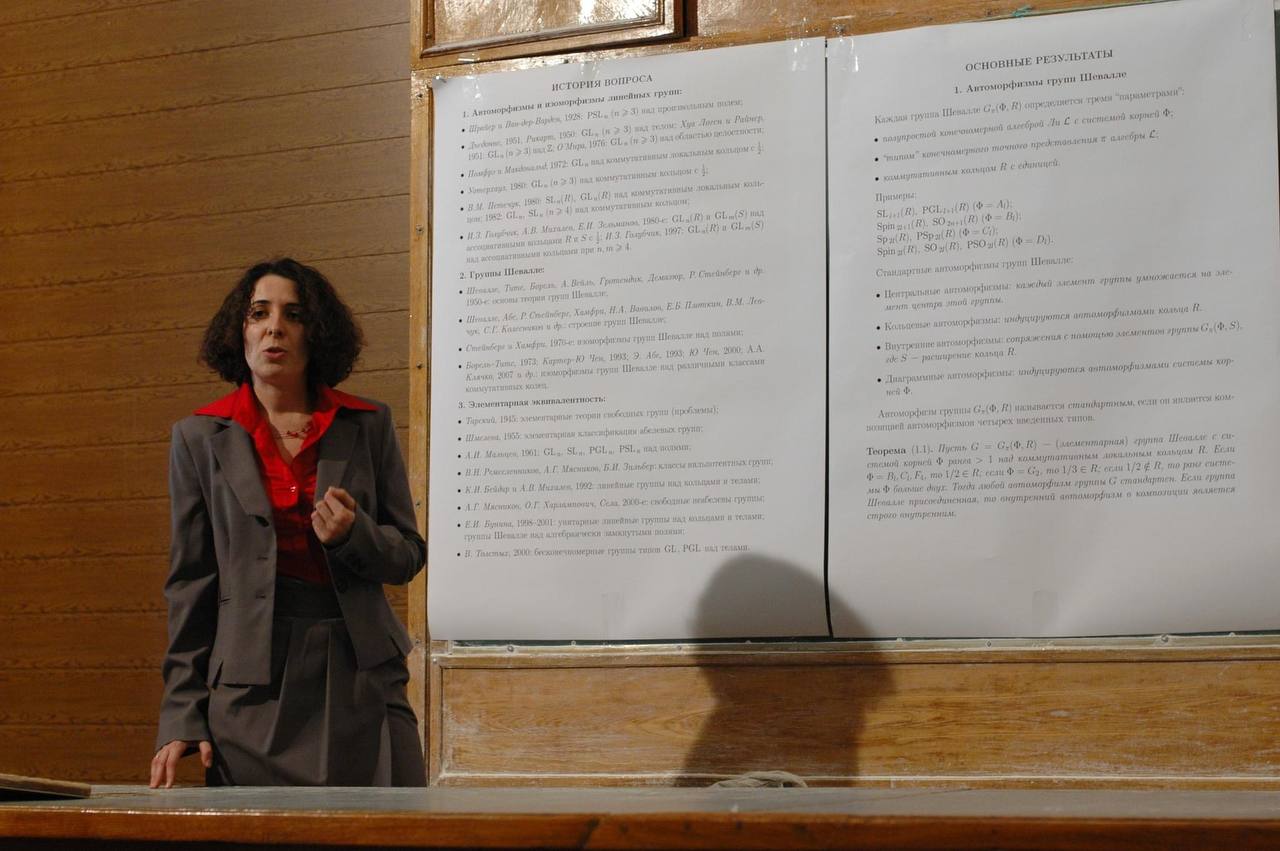
T-i: And if you compare the students?
EB: The students in Bar-Ilan surprised me just as much as the teachers. In Russia, everyone told me, «Well, of course, you won’t teach students like that anymore. There you will teach who knows who.» But so far all the students I have encountered are just as smart as the Russian students, but much more outgoing than the average mathematics student in Russia.
In the fall, I led a special course for undergraduate and graduate students, among whom there is a clearly positive selection process in Israel, because no one escapes from the army with the help of graduate and postgraduate courses, as in Russia. And I had exceptionally strong mathematicians, all the while being very sociable. I taught in English. For some of them it was their first course in English ever. But so was mine! We became friends, talked a lot, and some students started helping me. One guy made me a dictionary of translations of math terms from English into Hebrew. At the same time I also helped a lot of Ukrainian students, paid by the university. These are the guys from the Ukrainian math Olympiad team, and with them another guy from Moscow, also an Olympiadnik. They are very fast thinkers, but listening to the courses in Hebrew is still difficult for them, so I additionally studied with them in Russian. And in the spring I started a course in mathematical logic for different ages, including bachelors. And again I had good students, but they were sociable and open-minded. So I’m not at all disappointed with the students so far.
T-i: I often hear that schools in Israel are bad, the average level of education is low, and there is a terrible lack of teachers. Do you understand where strong students come from? We know how it worked in Russia, where there is a strong tradition of mathematical education and selection of capable children. For more than seventy years, a system of circles, Olympiads, and correspondence schools was formed there, in which strong children were drawn in different ways. If a child in Russia has at least some ability to mathematics, he will be taken out of the village and brought, if not to Moscow State University, then to a good university in Tomsk, Novosibirsk, St. Petersburg. Is there something similar in Israel?
EB: The first thing I found out is that schools actually have a selection process for mathematically talented children. In the second grade, children take a special test in the fall, after which those who pass the first round go to the second round in the spring. While the first round is in Hebrew, the second round is in Russian, French and English for those who haven’t lived in the country for very long. Then after the spring round some percentage of the best students are sent directly to a separate class in some cities. That’s how a math class is formed for the little ones. And in some cities that don’t have that class, they send them out once a week to take extra classes. And as early as sixth grade, there’s still a repeat of this test. New kids can come in at that point. Also, almost every city has math classes for high school students. My master’s students told me that they just went to the best math classes in their city.
T-i: So the selection system works, too?
EB: It may not be as streamlined as in Russia, but it works. In high school they may say: «Oh, you’re so clever! You need to go along with high school to study for your first degree at university.» There are special streams for high school students at universities, where students study after classes, in the evenings, slowly into the student program. And the most talented ones get a full first bachelor’s degree by the end of high school or by the end of their year of military deferment.
T-i: And go into the army?
EB: They may not. They still have the right to go to graduate school and only after that go to the army. Here I have two graduate students who have not been in the army yet, precisely because they studied under this system. I also know a colleague of mine, Sasha Tolesnikov, who runs a training camp for the Israeli math Olympiad team: it does exist! By the way, he managed to get the Bar Ilan University to finance it and to bring children from Ukraine here. He trains 50 people all over Israel. Of course, this is not the Russian scale, but you have to remember that the entire population of Israel is smaller than the population of Moscow.
T-i: So there are no problems with mathematics education in Israel?
EB: Not really. What’s the downside of this system? That the selection exists, but in order to get into it, the parent has to be persistent. The parent has to think about it, he has to keep it in his head and ask the teacher to send the child to tests and contests. For example, a parent comes in and says, «I want to enroll my child in this test.» And the teacher says, «What if it’s going to be stressful for him? What if he gets terribly nervous? What if he cries from this test? Maybe don’t do it.» I’ve heard this more than once from people I know who have been told this by teachers. At the school where I sent my son, one of the best schools in Tel Aviv, the situation was similar. Everyone was quietly silent about this test, and I ran and asked: «Write it down!» — Only after that did they write it down.
T-i: And how do you explain it?
EB: I have two versions so far. One version is that this is how the general Israeli ideology works: if you want something badly, get it.
We won’t give you anything by default. We already know that a lot of things here are built on this principle. You can achieve a lot, but you have to bang on the wall a few times and find a hole in it.
And the second version is that this is how the idea of opposing inequality works, that «selection,» «talent,» is something bad that leads to stratification.
T-i: Are you referring to the socialist tradition of Israel?
EB: Well, of course. For example, socialist tendencies are very strong in Tel Aviv; here, I’m told, they never organize special classes. And other cities that are less socialist, on the contrary, organize special classes. It all depends on the mayor’s office.
T-i: And what about teachers?
EB: Here I’m not optimistic at all. I like many things in Israel, in some respects I’m becoming a patriot, but the teachers terrify me. In the 1990s, a million new immigrants came from the former Soviet Union. Among them were, as everyone knows, many doctors, teachers, engineers, scientists. Doctors raised medicine in Israel, teachers raised education. Thanks in large part to the repatriates from the USSR, Israel is a different place. And Israelis know this very well. Ask anyone on the street: «Which math teachers are the best? – Of course the Russians!» But 30 years have passed and those teachers have retired. Nothing had grown in parallel, nothing! That is, it would have been possible at that point, while these wonderful teachers were working, to organize some kind of school to train new teachers for Israel. Nothing happened!
T-i: There was no transmission of tradition, culture, methods?
EB: Yes, the system has not learned to reproduce itself. In addition, Israeli teachers have quite low salaries, they are constantly on strike, and there is a huge shortage of teachers across the country. There are just physically few of them, even the weak ones. It’s getting to the point where a math teacher can put a YouTube video on the kids and leave. I can even see it in my son’s education, and he’s only in second grade and in a pretty good school.
T-i: With your HR experience, how do you see the solution to this problem?
EB: I think we should take advantage of the fact that good professionals are leaving Russia and Belarus again. We need to restore the pedagogical balance at their expense and create a system of staff reproduction. We need a special teacher training programme for this. This is why I started working on it. I met with representatives of various branches of power and heard the answer: «Yes, yes, we want it ourselves.» If you can find a thousand Russian-speaking teachers who are willing to be teachers in Israel, it will raise Israeli schools. It’s funny to me to hear that: a thousand? Only a thousand? If you were talking about a thousand in Russia, then…
T-i: No one would notice at all. A thousand — this is sent to the conference from Krasnoyarsk region, for example.
EB: Of course, but a thousand is a lot. And what I did for the experiment was this: we posted a questionnaire, and we distributed it on Facebook on our page, there, in several chats, that is, without any major advertising. With the question, «If you’re a teacher and you want to be a teacher in Israel, here we’re thinking about a program to help you integrate into one. Tell us about yourself, tell us what you need.»
T-i: And what did you get?
EB: We got 300 applicants in a few days. Of those who filled out the questionnaire, two-thirds already live in Israel: in the last year they moved. And a third are moving in the next few months. That is, they don’t need help with the documents: they have already decided everything themselves. What are they asking for? All ask for help with Hebrew studies, adding a specific Hebrew course specifically for their subjects. All are asking for help with obtaining a teacher’s license and proof of seniority. And the third thing they ask is for the community to help with employment. That is to gather, in fact, interested school principals. I think all of this can be implemented.
T-i: What do you think of the expansion of ideology into Russian schools and universities? It began even before the war in recent years. But with the outbreak of war there were orders, decrees of the Ministry of Education and the Ministry of Science and Higher Education, which are designed to acquaint students with the «party line.» Will it work or won’t it work?
EB: The answer is known. I came to school in 1983. On September 1 I had a book in front of me about a curly-haired Lenin, whom I was absolutely in love with, because that’s how he was described to me. And how he used to make an inkwell out of bread crumbs, and how he mended felt boots in exile – how beautiful it was! He seemed like an ideal man to me. I dreamed of becoming an octogenarian, then a pioneer girl. I was even in charge of political information in class. One day I came home with my jacket open (even though it was cold) so everyone could see my Pioneer tie, so proud that I lived in the USSR, that we had Lenin, that we were heading toward communism. Now everyone says that in the 1980s no one took ideology seriously. Yes, adults didn’t, but I was seven, eight, nine years old. I came home, sporting a tie, my dad looked at me and said: «Okay, it’s time to take care of you.» Pulled the books off the first shelf, pulled out what was hidden behind them, and said: «Go read it, and then we’ll talk.»
T-i: What was on that short list of forbidden literature?
EB: It was «The Life and Extraordinary Adventures of Soldier Ivan Chonkin» by Voinovich, «The Steep Route» by Yevgenia Ginzburg, and the third book, I think, «The Gulag Archipelago», but I couldn’t finish it and was forgiven: too heavy a read for a nine-year-old. At that point, Dad just couldn’t take it anymore: «I can’t see you acting anymore!»
But not everyone had dads with samizdat, after all. So my personal experience is that, yes, the invasion of ideology in schools is bound to have an effect, can’t help but have an effect!
Everything works on a child. It worked even in the crumbling 1980s, when not a single adult took it seriously – everyone laughed, they just told jokes.
And children believed it, because it was natural for children. That’s how a child adapts to the environment, to reality, to the school where he is most of the time. I don’t think the authorities hope to get 100 percent convinced children. Eighty percent is enough for them.
And in vain some parents in Russia now think, «Well, this is all ridiculous, you can think that my child is built in kindergarten and at school with a letter Z. None of us take it seriously». No, then you can get something very unexpected from your child.
T-i: Scientists in Russia are now in a stalemate. On the one hand, if they keep quiet about their anti-war stance, they are seen as collaborators of the regime. On the other hand, to speak openly against the war means going to jail or losing your job. On the other hand, it is now virtually impossible for scientists to leave Russia, since they are not given work visas. At the same time, active Ukrainian scientists are calling on the scientific world to boycott their Russian colleagues. In Israel, academia behaves very differently. Here there are no restrictions or bans on the state, corporate, or personal level for Russians. Can you understand why?
EB: More than once I have heard from Israelis the phrase: «We do not organize boycotts, because we know what a boycott is.» Many of them have experienced it firsthand, and now Israelis try not to participate in boycotts. But there is another reason, which can be seen in the case of mathematicians and physicists. As I said, there are many scientists in Israel who left the post-Soviet republics in the 1990s and early 2000s, who have not lost touch with their colleagues, and who have influence over university administrations here. So, they always try to explain the real situation to their Israeli colleagues. They say, «Well, imagine this: there is a young mathematician. He has nowhere to go, even though he really condemns the war. If he speaks openly, he will be jailed. So he sits quietly, writes articles, and teaches students. Is it right to condemn him? I think not.»
T-i: The position of Ukrainian scientists is that if this mathematician teaches students well, then his students will do just as well in the military sector. And, the better teachers do their job, the worse it is for the world as a whole.
EB: The logic of our Ukrainian colleagues is understandable, and it is the logic that keeps bugging me. And it applies not only to science, but also to Central Bank policy and new technologies. They seem to carry out constructive work, but in fact it leads to all sorts of things. But in the case of scientists, as they say, there are nuances. For example, let’s imagine a man who teaches math to students and gets them into graduate school abroad. And thank goodness for that. And when we say: let’s boycott everyone who hasn’t gone, it sounds not only unfair, but unreasonable. Because those who haven’t left can often be more ethically honest than those who happen to leave and get a good position. This is especially true for those who are at or near retirement age. They are the ones I’m most worried about, here they are, practically trapped. They certainly have nowhere to go. In Europe, in Israel, the legislation is quite strict in this sense, meaning that the retirement age is really a retirement age. And people have almost no chance of finding a job there. And in Russia, they can still stay in the profession.
T-i: Many specialists from different fields who left Russia after the war had a serious crisis of purpose. What they had been building all their lives collapsed in one day. Did you have a crisis of purpose? And what are your new goals, if Yandex and Moscow State University are in the past?
EB: Of course, I had a crisis of different waves and different complexities. It was terribly miserable to give up everything that had been done. There was self-pity. Then you think, «Well, what am I feeling sorry for myself? People are being killed, people’s homes are being bombed, their children are being killed. You are safe, your loved ones are healthy, you have a place to live and something to live on. Why feel sorry for yourself?»
T-i: Did it help?
EB: To be honest, not for long. Then you start thinking, «Wasn’t everything you were doing evil?» You start going over specific things in your mind: what if this is now being used in ways you never imagined? What if we created the «Yandex tutorial,» and the authorities take it away and shove their ideology in it? Then I feel despair.
T-i: How do you save yourself?
EB: I force myself to zero in and start building anew. I forbid myself to compare my present life with my past life, not only with the scale of tasks, but with the level of life, welfare, level of respect – I could list many things… And then — math saved me! While working as a top manager at Yandex, I suffered terribly from a lack of time and energy to do normal science. In those years I wrote one simple article a year. And after I left, I had time for science, but I returned to it through pain, with great difficulty entering the state where you think all the time on the task.
T-i: What did you have to do to yourself to become a scientist again?
EB: I had to regain my level of thinking from twelve years ago. Although at my age, that’s not so easy to do anymore. And so last summer, about five months after I left, I got so overwhelmed, I tried to turn myself around and felt my brain fiddling. And then somehow magically it all came together, and I was back to the level of thinking science I had before. I’ve already written several good articles and continue to do so. I’m having such a great time!
T-i: How long does it take you to immerse yourself in your task and start thinking from where you left off?
EB: It depends on how long ago you got out of it. If you got out yesterday, you don’t need anything. If came out a week ago, like an hour is needed. If I got out a month ago, you need a few hours, and so on. But I try not to get out of task thinking for long periods of time. And my new colleagues help me a lot in this. Professor Eugene Plotkin, who played a big role in getting me a job at Bar-Ilan University, doesn’t let me stop thinking about mathematics. He calls and says, «Okay, we have a problem to discuss.» And so I walk an hour to work and think… In my new life, it’s been a lifesaver for me.
T-i: Do you keep in touch with any of your Russian students?
EB: Of course. Some students have gone to other professors, and some informally stayed with me.
T-i: What do you mean «informally»?
EB: Officially I can’t be their academic advisor anymore, but I can be like a second informal advisor. So we stay together: me, the students, and the mathematics. No one can take that away from us!
Questions were asked by OLGA ORLOVA
Elena Bunina, Olga Orlova 17.04.2023

